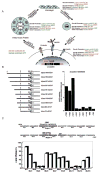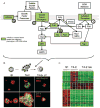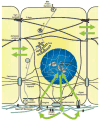Microenvironmental regulators of tissue structure and function also regulate tumor induction and progression: the role of extracellular matrix and its degrading enzymes
- PMID: 16869771
- PMCID: PMC3004779
- DOI: 10.1101/sqb.2005.70.013
Microenvironmental regulators of tissue structure and function also regulate tumor induction and progression: the role of extracellular matrix and its degrading enzymes
Abstract
It is now widely accepted that elements of the cellular and tissue microenvironment are crucial regulators of cell behavior in culture and homeostasis in vivo, and that many of the same factors influence the course of tumor progression. Less well established is the extent to which extracellular factors actually cause cancer, and the circumstances under which this may occur. Using physiologically relevant three-dimensional culture assays and transgenic animals, we have explored how the environmental and architectural context of cells, tissues, and organs controls mammary-specific gene expression, growth regulation, apoptosis, and drug resistance and have found that loss of tissue structure is a prerequisite for cancer progression. Here we summarize this evidence and highlight two of our recent studies. Using mouse mammary epithelial cells, we show that exposure to matrix metalloproteinase-3 (MMP-3) stimulates production of reactive oxygen species (ROS) that destabilize the genome and induce epithelial-mesenchymal transition, causing malignant transformation. Using a human breast cancer progression series, we find that ADAM-dependent growth factor shedding plays a crucial role in acquisition of the malignant phenotype. These findings illustrate how normal tissue structure controls the response to extracellular signals so as to preserve tissue specificity and growth status.
Figures








References
-
- Allinen M, Beroukhim R, Cai L, Brennan C, Lahti-Domenici J, Huang H, Porter D, Hu M, Chin L, Richardson A, Schnitt S, Sellers WR, Polyak K. Molecular characterization of the tumor microenvironment in breast cancer. Cancer Cell. 2004;6:17. - PubMed
-
- Ayala F, Corral J, Gonzalez-Conejero R, Sanchez I, Moraleda JM, Vicente V. Genetic polymorphisms of platelet adhesive molecules: Association with breast cancer risk and clinical presentation. Breast Cancer Res Treat. 2003;80:145. - PubMed
Publication types
MeSH terms
Substances
Grants and funding
LinkOut - more resources
Full Text Sources
Other Literature Sources
Molecular Biology Databases
Miscellaneous
